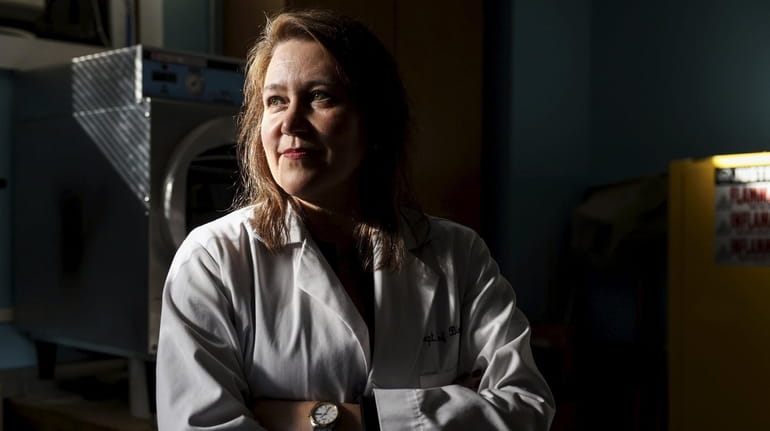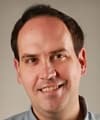Long Island college professor analyzes what life would be like on Mars mission

Professor Tetyana Delaney at St. Joseph's College in Patchogue on Friday. Credit: Newsday/Steve Pfost
St Joseph’s College biology professor Tetyana Delaney is preparing for life on Mars.
Delaney was selected for a NASA research project to gauge what would be the physical and mental toll on astronauts during a mission to Mars.
NASA selected Delaney, 51, of Oyster Bay for the SIRIUS 21 mission, or Scientific International Research in Unique Terrestrial Station in Moscow. She was born in Ukraine and is a professor of natural sciences with a doctorate in molecular biology and biotechnology. The mission is a joint venture with NASA and Russia’s Institute for Biomedical Problems.
Delaney spent two months in Moscow joining the NASA crew, which was split into two teams — the primary crew that will be isolated for eight months in a space module and Delaney’s crew, which worked with the primary team as a backup crew before the pod was sealed.
Her training included simulations for driving the Mars Rover, docking the International Space Station and conducting experiments in limited isolation and confined spaces. She returned to Long Island last month as the remaining primary crew began their eight-month mission.
"Many people don’t know what astronauts actually do. What is the purpose for pilots and engineers, what is their job and end goal?" Delaney said. "It’s not just flying to space and orbiting around the earth. They have to do the research themselves with biology and physics and be capable to pick up and perform it."
NASA officials believe a manned mission to Mars is no longer a tale of science fiction and expect to hopefully complete a mission in the next few decades, said William Brandon Vessey, element scientist for flight analogs with NASA’s research operations and integration at the Johnson Space Center in Houston.
But NASA is first aimed at sending astronauts back to the moon through its Artemis mission to explore the lunar surface and use that research to get to Mars.
"It’s part of NASA’s plans going forward," Vessey said. "The longer-term pathway to send humans to Mars is something the human research program is heavily focused on and enabling us to do those missions safely in our lifetime. It’s just a matter of time before we do those missions. We know those missions are happening in the relatively near future and we need to be ready for them."
Delaney was selected based on her scientific experience and research background as well as her fluency in the Russian language, Vessey said. Most astronauts range in age from about 30 to 50 to measure how space travel affects different groups of people.
"For these missions, we select people as astronaut-like as possible, in good physical health and more importantly the studies we’re doing and background and psychology and highly educated with professional experience," Vessey said. "In Dr. Delaney’s case, she fit the bill for astronaut-like characteristics and a strong STEM background."
Delaney applied for the program last year before it was delayed by the COVID-19 pandemic. She said she started primary training in mid-August with the 12-member crew in Moscow.
The crew was simulating the eight to nine-month mission it would take to travel to Mars as well as 70 different experiments being conducted onboard the space module such as recording self-biometrics.
While she wasn’t in isolation, she went through the same basic training and quarantine to live in the test facility. NASA didn’t simulate microgravity, but simulated the types of experiments for a real mission.
The former chair of biology at St. Joseph’s College, biology professor Frank Antonawich, said Delaney’s work on immunology was a perfect fit for a Mars mission. She has been studying lipids using technology in the new mRNA COVID-19 vaccines to test long-term effects in the body while working with microbes in small spaces.
"Things in space have to be small scale and everything from medicines to food have applications in nanotechnology and her specialty is accumulation and toxicity and testing," Antonawich said. "When they’re up there, they’re on their own. You have to know how to do it. The data when they get back that is used for this can contribute to advancements in medications and bioavailability."
Delaney also continued to teach her classes eight time zones away using Zoom sessions with her students. Now that she has returned to Long Island, she remains in touch with the isolated team in Moscow.
She said she is not sure if she will ever be a real astronaut, but is encouraged by commercial space flight and space travel by 90-year-old William Shatner.
"I grew up in the Soviet Union, but the space program was so far a dream and unreachable," Delaney said "To be in the middle and taking advantage of speaking both languages is an unforgettable experience. Becoming an astronaut is maybe something I can do someday."

